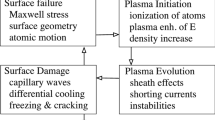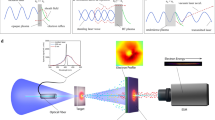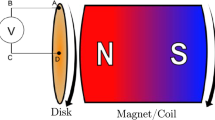Abstract
THE importance of the application of high voltages to vacuum tubes is self-evident. Its possibilities in connexion with radioactivity have been emphasised lately by Sir Ernest Rutherford1. For the last two years we have been occupied in developing a laboratory method for the production of high voltages in a form suitable for application to vacuum tubes. Our problem divided itself into two parts: (a) The production of high voltages; (b) their application to vacuum tubes.
This is a preview of subscription content, access via your institution
Access options
Subscribe to this journal
Receive 51 print issues and online access
$199.00 per year
only $3.90 per issue
Buy this article
- Purchase on Springer Link
- Instant access to full article PDF
Prices may be subject to local taxes which are calculated during checkout
Similar content being viewed by others
References
E. Rutherford, NATURE, 120, p. 809; Dec. 3, 1927.
F. W. Peek, jun., Jour. Franklin Inst., 197, p. 1; 1924.
Author information
Authors and Affiliations
Rights and permissions
About this article
Cite this article
BREIT, G., TUVE, M. The Production and Application of High Voltages in the Laboratory. Nature 121, 535–536 (1928). https://doi.org/10.1038/121535a0
Issue Date:
DOI: https://doi.org/10.1038/121535a0
This article is cited by
-
Linearbeschleuniger und Tandem-van-de-Graaffs: Werkzeuge der Schwerionenforschung
Naturwissenschaften (1980)
Comments
By submitting a comment you agree to abide by our Terms and Community Guidelines. If you find something abusive or that does not comply with our terms or guidelines please flag it as inappropriate.



